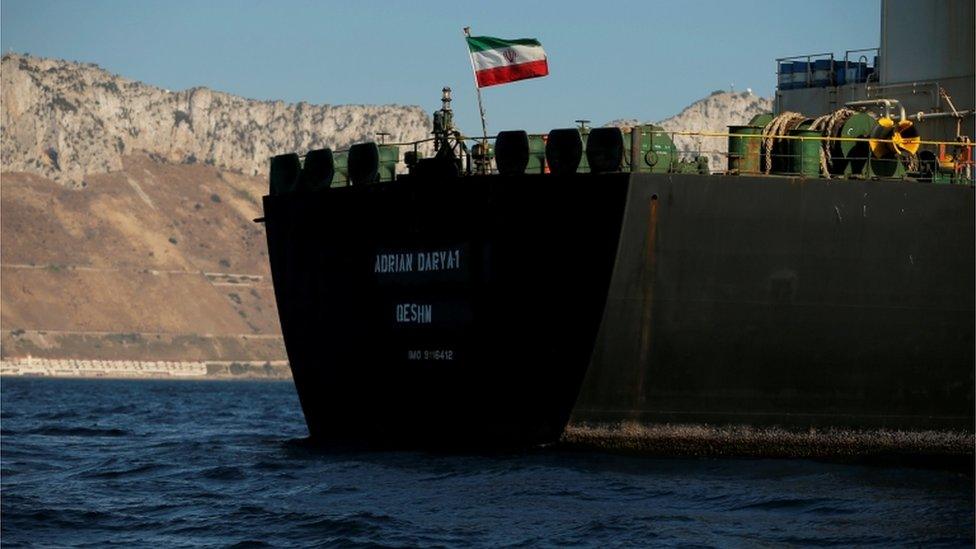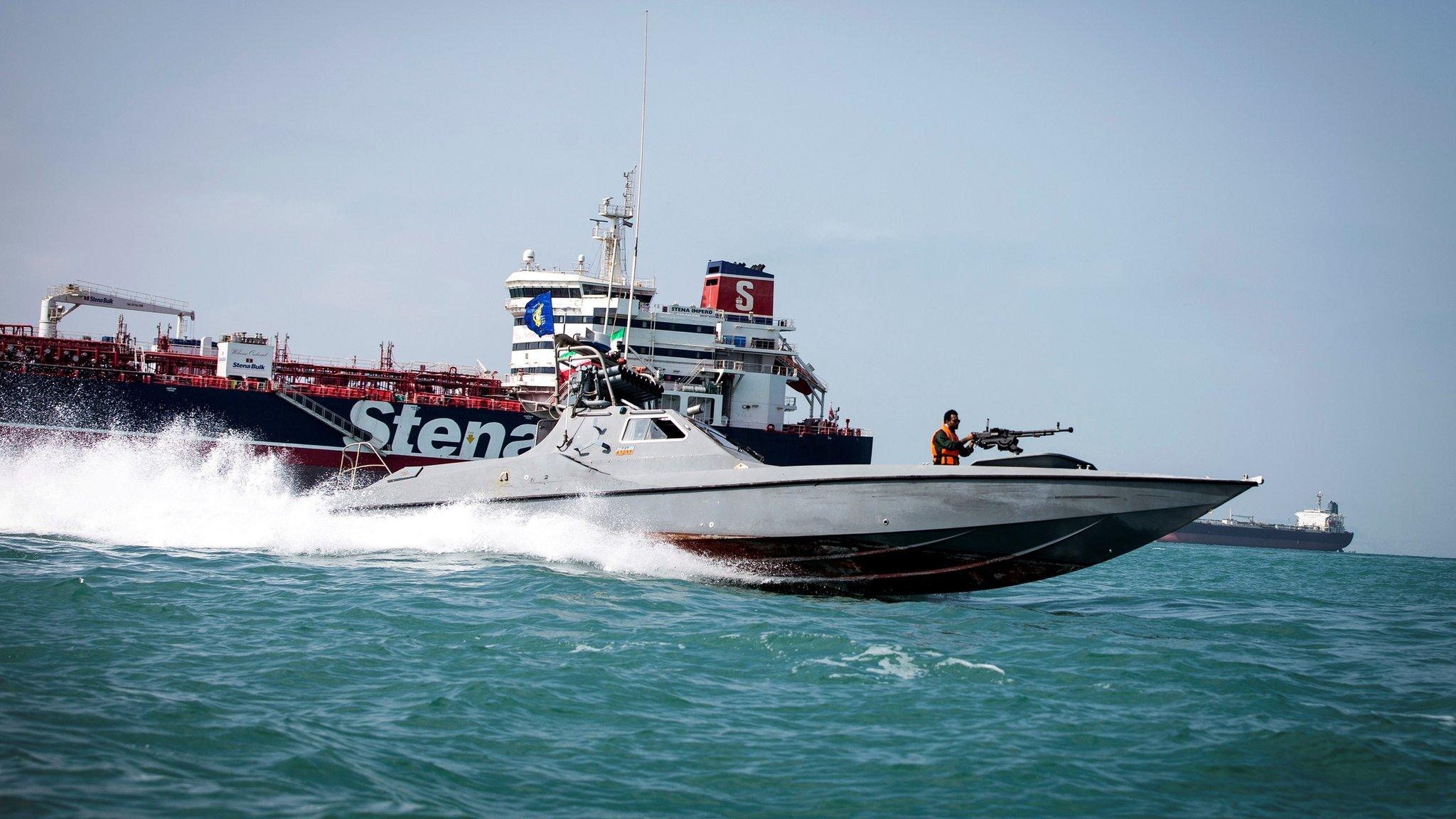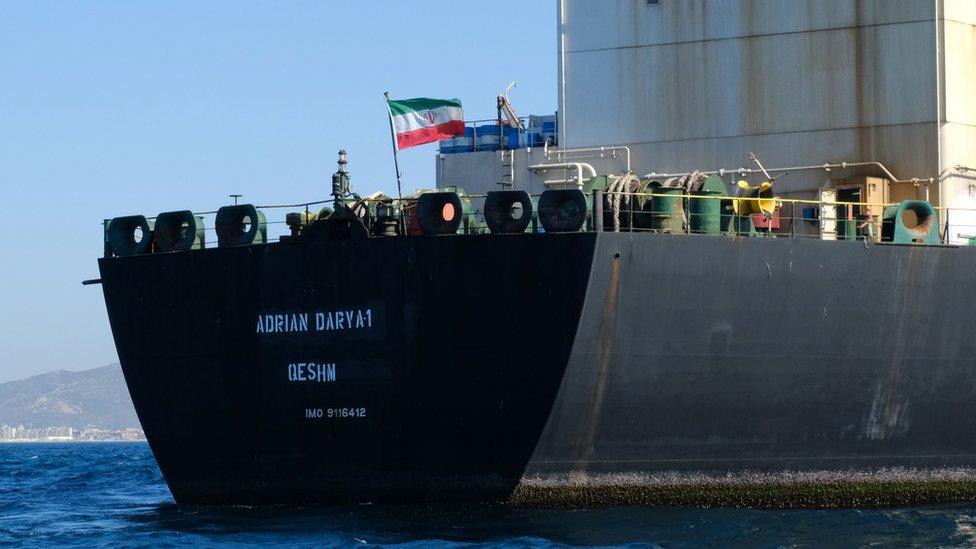Iran tanker: US offers captain millions to hand over ship
- Published

The Adrian Darya 1 left Gibraltar in August, despite a last-minute US effort to keep it detained
The US state department has confirmed it offered millions of dollars to the captain of an Iranian oil tanker which is at the centre of a diplomatic row.
Brian Hook, head of the department's Iran Action Group, emailed the captain of the Adrian Darya 1 about sailing it somewhere the US could seize it.
The vessel was suspected of moving oil to Syria, and was temporarily impounded by UK authorities in Gibraltar in July.
It was released last month after Iran gave assurances about its destination.
The US justice department, which had tried to block the release, then issued a warrant to seize the tanker.
Reports of the cash offer first appeared in the Financial Times, external on Wednesday and have been confirmed by the state department.
"We have conducted extensive outreach to several ship captains as well as shipping companies," a spokeswoman told AFP news agency.
The US blacklisted the tanker last Friday. A treasury department statement said the vessel was being used to transport 2.1 million barrels of Iranian crude oil, external for the benefit of Iran's Revolutionary Guard - a branch of the country's armed forces the US has designated a terrorist organisation.
What did the emails say?
According to the Financial Times, Mr Hook sent an email to the Indian captain of the Adrian Darya 1, Akhilesh Kumar, before it imposed sanctions on the ship.
"I am writing with good news," the email read. The Trump administration was willing to pay the captain several million dollars to take the ship somewhere it could be seized by US authorities.
The emails reportedly carried a state department phone number to make sure the captain - who took over the ship after it was impounded - did not think they were fake.
The BBC obtained footage of the inside of the tanker when it was detained in Gibraltar
Mr Hook told the newspaper the state department was "working very closely with the maritime community to disrupt and deter illicit oil exports".
Mr Kumar ignored the emails. The US then imposed sanctions on him personally when they blacklisted the Adrian Darya 1.
On Twitter, Iran's Foreign Minister Javad Zarif accused the US of "outright blackmail".
Allow X content?
This article contains content provided by X. We ask for your permission before anything is loaded, as they may be using cookies and other technologies. You may want to read X’s cookie policy, external and privacy policy, external before accepting. To view this content choose ‘accept and continue’.

The Trump administration announced on Wednesday new sanctions on an Iranian shipping network used to sell oil, external, and offered $15m to anyone who could help to disrupt the system.
What is the tanker row?
The Adrian Darya 1, previously known as Grace 1, was detained by British authorities in Gibraltar on 4 July after it was suspected of moving oil to Syria in breach of EU sanctions.
It was released on 15 August after Iran gave assurances it would not discharge its cargo in Syria - despite the last-minute US effort to prevent its release.
Tracking websites indicate the ship is currently in the eastern Mediterranean, although it has reportedly turned off its signalling device.
Its initial seizure sparked a diplomatic crisis between the UK and Iran, which saw Iran seize a British-flagged and Swedish-owned oil tanker, the Stena Impero, in the Gulf.
On Wednesday it released seven of the ship's 23 international crew. The remaining 16 crew members are believed to be with the vessel near Iran's southern port of Bandar Abbas.
- Published4 September 2019

- Published31 August 2019
